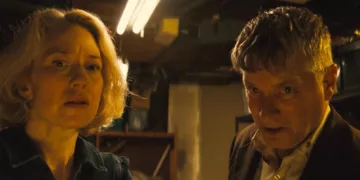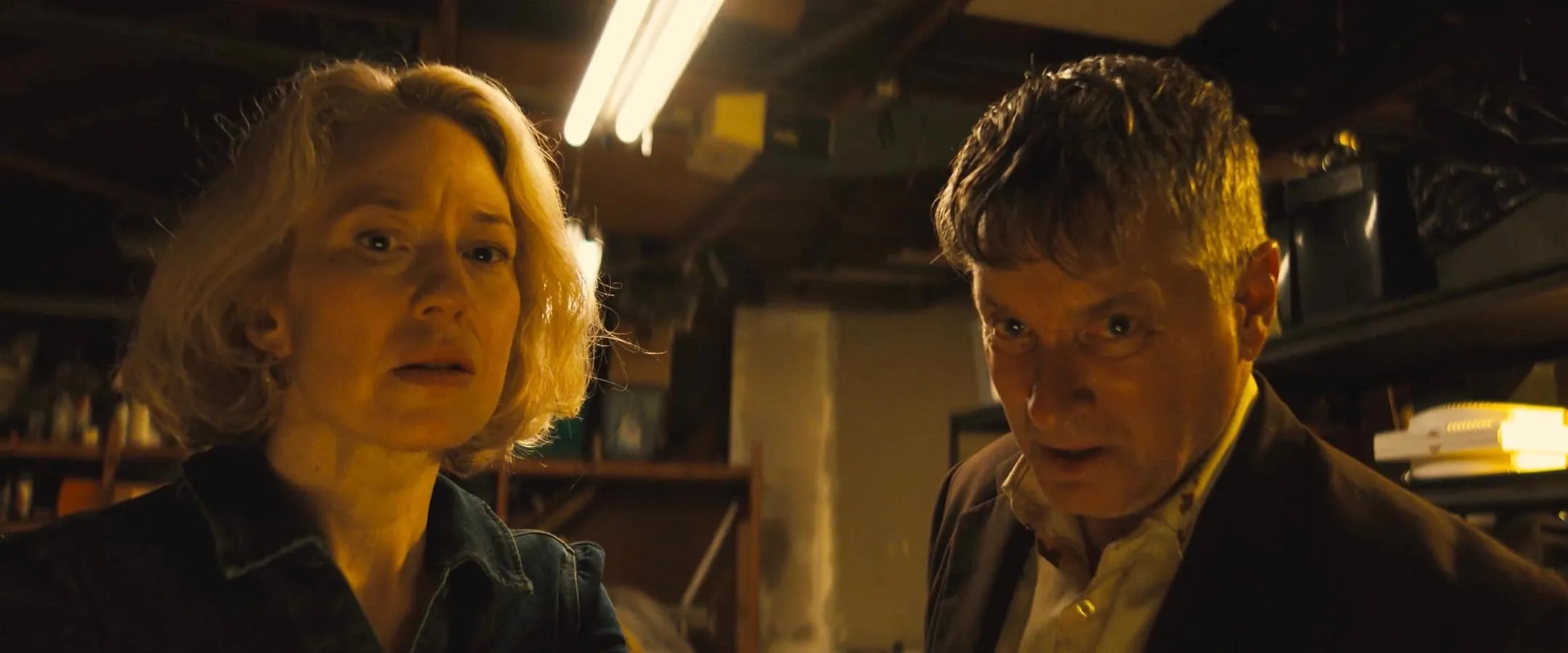Don emerges from prison exhausted after a decade inside. Played with subtle nuance by Shea Whigham, Don just wants peace. But escaping his past won’t be easy. His former criminal associate Armen still has a hold on him, pressuring Don into one last job.
The target is Phyllis, Armen’s partner in more ways than one. Carrie Coon brings Phyllis to life as a complex woman used to manipulating men, though maybe hoping for more. When Don hesitates pulling the trigger, an unexpected bond forms between him and Phyllis.
Together they uncover a secretive world hidden amongst LA’s sprawling suburbs, with Armen at its dark center. Don remains desperate to break free once and for all, while Phyllis grows curious about a life away from violence. Director Jeffrey Reiner skillfully weaves darker themes into his tale but also sees glimmers of hope in even the most damaged souls. Perhaps on the shores of a quiet lake, Don and Phyllis may find the renewal they never thought possible.
Plotting Redemption
We get to know Don and Phyllis from the start. Don’s just left prison after ten years, yet it remains a mystery why exactly he was inside. He hopes for a fresh start but finds many of his old contacts are gone. Phyllis, on the other hand, remains tied up in the criminal underworld, tangled especially with her menacing partner Armen.
Their paths cross due to Armen. He owes Don money yet also believes Don owes him for some past misdeed. To settle the score, Armen blackmails Don into a terrible task—kill Phyllis. Don refuses to be a murderer. But when a gun is drawn, he accepts it just to save his own skin.
Don begins shadowing Phyllis, searching for the chance to end her life as demanded. Yet when the moment comes, he stops himself. A bond is forming between these two damaged souls. Phyllis proposes joining forces instead of becoming victims.
Together they hatch a plot to turn the tables on Armen. Stealing from the man proves no easy feat, as his double-crosses and dark dealings seem to know no bounds. Explosive confrontations ensue as they close in on their target. But with each twist in the road, their partnership strengthens.
By the climactic finale, it’s clear Don and Phyllis have found more than an ally in each other. They’ve awakened to the possibility of redemption through their unlikely friendship. Can they finally bid farewell to the shadows of their past for good, or will old ghosts refuse to release their grip?
Shades of Gray in a Sunny Noir
Lake George sinks its teeth into some meaty themes beloved of the neo-noir genre. You see the influence of classics like Double Indemnity in its focus on characters clinging to lives of crime. But director Jeffrey Reiner puts his own twist on familiar territory.
Where shadows often conceal nefarious deeds in traditional noirs, this story plays out in bright California sunshine. Yet its characters still wrestle with dark pasts and compromised morality, and even daylight cannot lift the shadow of mistakes. Don and Phyllis especially feel weathered by experience, burdened by years lost that they’ll never reclaim.
Redemption, moreover, is a prominent thread. Both protagonists long to separate from criminal contacts like Armen, desperate for normalcy even if they lack hope. In each other they find an ally, awakening to the possibility of forging new identities and futures. Their partnership hints that even damaged souls need not remain defined by mistakes.
Moral ambiguity also saturates dealings among thieves. Armen uses both violence and manipulation casually to guard his operation. The line similarly blurs for Don when forced to make hard choices to survive. Reiner probes how circumstance alters people’s vision of right and wrong.
Perhaps most striking is that while set in California sunlight rather than the noir underworld’s more familiar shadows, bonds of desperation prove just as binding. When pushed to edges, humans may stoop lower than expected regardless of setting. In the end, no setting or situation can fully divorce people from their past or permeability to corruption.
Captivating Company
At its heart, Lake George stands or falls on those portraying its flawed characters. Thankfully, the performances could hardly be finer.
Shea Whigham sinks his teeth into the role of Don, imbuing a character of few words with rich interior life. Each gesture and reaction speak volumes about this man weathered by mistakes. Though broken, glimmers of goodness cling on within Whigham’s nuanced turn.
As Phyllis, Carrie Coon outwardly sparkles but hints at shadows too. She excels at phasing from levity to suspicion to compassion, a complex woman weary of her old choices yet curiously energized by Don’s presence. The pair share crackling chemistry vital to keeping their dynamic compelling.
Supporting players prove capable foils. Armen appears a typical thug through Glenn Fleshler’s sneering work. But moments of understanding surface too, showing depths to this villain. Max Casella meanwhile finds wry humor as loyal henchman Harout.
Ultimately, the performers bring needed humanity to flawed protagonists. Neither Don nor Phyllis feel flatly defined by their pasts, thanks to nuanced work that stays compelling to the final scene. Their journey gains emotional weight through talented hands guiding it, proving commercial success rests upon quality work from capable storytellers. Under expert performances, even well-worn genre premises feel freshly compelling.
Weaving Wit amid Woeful circumstance
Director Jeffrey Reiner deftly maneuvers Lake George through sometimes turbulent emotional terrain. He navigates moments of drama with expertly employed dark comedy. Reiner clearly loves neo-noir tropes but brings a quirky wit, breathing fresh life into familiar workings.
Scenes bursting with tension dissolve into perfectly tongue-in-cheek humor. Witness Don’s initiation or their robbery attempt’s canine interruptions. Yet Reiner balances these lighter notes while retaining complex characters and hard-scrabble realism. There’s enough grit beneath humor to feel stakes remain high even as smiles spread.
His use of LA locations likewise presents a shiny veneer masking murkier depths. Sprawling suburbs and riches glimpsed merely accentuate hard luck tales within. Reiner captures the grimy underbelly beneath flashy exteriors, finding poetry in life’s ironies. Cinematography embraces both beauty and bleakness within a single frame.
Perhaps most impressive is how deftly Reiner conducts shifting tones. Suspense, pathos, and mirth flow cohesively, never feeling awkwardly forced together. It’s a testament to his command that material as diverse as Coen-esque gallows humor and climactic showdowns feels perfectly natural within the same narrative. Under his guidance, Lake George finds that sometimes humor can run deepest during our most troubled moments.
Does the Darkness Hold?
Lake George certainly swims in themes beloved of neo-noir. From its focus on damaged souls to the moral ambiguities of crime, Reiner taps rich veins of the genre. Yet putting its own quirky spin helps the material feel fresh.
Though playing in the California sun, darkness still lingers heavily over protagonists. Whigham and Coon ensure we feel the weight of mistakes through nuanced work. Even so, bits of wit and warmth in their bond give glimpses of light. It’s a testament to Reiner’s balancing act that such tonal shadings feel cohesive.
Homages to classics are plentiful but sneakily done. Motifs like the Phyllis reference come across as endearing tribute rather than borrowing. Reiner injects just enough revision that the beatest of paths feel thrillingly reimagined.
At times, tonally wandering too far between gravity and humor, certain plot conveniences diminish impact. Yet performances and clever subversions of formula make Lake George a pleasurably twisty neo-noir ride. It engages with its shadows more successfully than most while finding rays of humanity even in darkness’ clutches.
Fans of the genre seeking something offbeat will find much to savor. As will those who enjoy character-driven indies with a twist of wit amid their wounds. A film that demonstrates how hope might spring even from seedy shores, Lake George deserves viewers willing to float along its peculiar currents.
Finding Light amid Life’s Shadows
Lake George entertains through a twisty plot and stellar performances, even when tonally adrift. Reiner proves masterful steering varied themes. His direction imbues dim subject matter with rays of hope, proving light can emerge unexpectedly.
Don and Phyllis feel richly lived-in thanks to leading turns that inhabit fraught souls with nuance. Their alliance, improbably blossoming from violence’s seeds, touches as the beating heart driving the film.
Reiner pays homage flawlessly to noir tropes while finding new shadings. His vision demonstrates darkness need not doom characters to darkness itself. Perhaps most praiseworthy is transforming familiar genre components into a fresh, poignant story of human resilience.
Though not flawless, Lake George moves with idiosyncratic charm. It exhibits craftsmanship, raising the humble B-picture genre to emotional weight. Most praise goes to a director nourishing glimmers of reconciliation even amid life’s bleakest moments, proving redemption possible for flawed characters and audiences alike.
Lake George deserves appreciation for reminding us that shadows seldom illustrate life’s fuller palette. Its portraits of tough yet tender souls merit reflection on humanity’s shared capacity for darkness and light.
The Review
Lake George
Lake George offers an offbeat yet poignant neo-noir twist on redemption, anchored by nuanced performances that breathe empathy into flawed protagonists. Though tonally imperfect, Reiner's eccentric vision crafts a moving ode to human resilience through even our darkest hours.
PROS
- Nuanced performances by Whigham and Coon that imbue complex characters with depth
- Clever subversions and homages that refresh familiar noir tropes
- Focus on redemption and humanity's capacity for both darkness and light.
- Eccentric blend of drama, darkness, and humor with deft tonal balance
- Captivating character-driven story and beautifully filmed Los Angeles locations
CONS
- Narrative flow is uneven at times with an occasionally slow pace.
- Nearly two hours in length for its hybrid tone
- Certain conveniences diminish the impact of its tension-filled climaxes.
- Sitting awkwardly between comedy and drama genres without fully marrying either


















































Discussion about this post